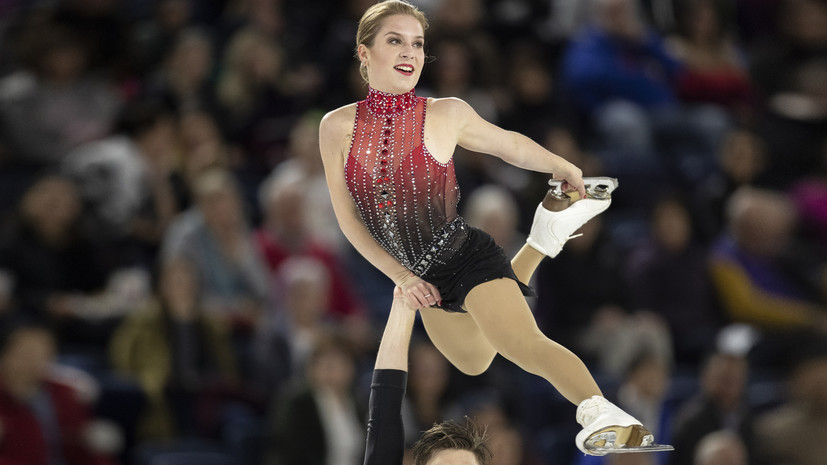The death of figure skater Ekaterina Aleksandrovskaya, who died on July 18 at the age of 20, fell out of the window of her house, has acquired new details. Australian media reported that the junior world champion was addicted to alcohol, suffered from epileptic seizures and experienced serious financial difficulties. Her tragic fate raised the question in the country of at what age it is permissible for athletes to change their citizenship, so that this does not lead to dire consequences for them.
The Daily Telegraph journalists interviewed several people with whom Aleksandrovskaya was closely associated, and learned shocking information about the last years of her life. Moving to Australia and performing in tandem with Harley Windsor not only allowed the skater to compete at the Olympic Games and write her name in the history of figure skating, but also led to such consequences.
Former Australian champion in single skating Belinda Noonan, who became a mentor for Alexandrovskaya after she moved to Sydney, recalled how the athlete confessed to her drinking. At the age of 14, the skater lost her father, and on the anniversary of his death, she drank vodka, which was intended as a gift for the coach. The next day, Aleksandrovskaya was scheduled to meet Windsor, who came to Moscow for this, and the athlete had to go out on the ice with a splitting head.
“Katya said that the day before they met was the worst in her life. She not only drank, as children usually do, but also did not give the present to the coach, ”said Noonan.
Soon after moving to Australia, Aleksandrovskaya had a new problem. She experienced epileptic seizures twice while shopping. In early 2017, the skater also fell heavily during training and suffered a concussion. Coach Galina Pashina recalled that Aleksandrovskaya sometimes walked in her sleep.
Despite the obvious health problems, the athlete did not want to seek help from doctors, and no one on her team tried to dissuade her. She, being already the world champion among juniors, persistently went to her goal of getting to the Olympic Games. After passing the selection, Aleksandrovskaya quickly received Australian citizenship and was able to go to Pyeongchang, where she took 18th place.
The couple dreamed of competing again at the Olympics in 2022, but in 2019 Aleksandrovskaya unexpectedly reduced the funding that she received as an athlete of the national team. Instead of $ 75 thousand a year, she could only count on $ 20 thousand. This led to the fact that she began to need money and could not even afford to rent a house in Sydney. She had to sleep in public places, and sometimes Noonan bought her food. Aleksandrovskaya practiced her training in the canteen at the ice rink. Against the background of all these troubles, the girl's problems with alcohol worsened, which even a visit to a specialist did not help to resolve.
Before the next season, Aleksandrovskaya and Windsor returned to her former coach Andrei Hekalo. At the end of 2019, she was forced to skip workouts due to poor health, and in January, the skater was hospitalized, where she spent two weeks. Doctors diagnosed her with epilepsy and recommended to end her sports career.
Hekalo, in a conversation with reporters, admitted that he wanted Aleksandrovskaya to continue performing, but Windsor refused to cooperate with them further and returned to Australia, and the couple broke up. He understood that his former partner was in poor condition, and wanted to come to her again in the future, but could not because of the coronavirus pandemic.
The fact that Aleksandrovskaya received an offer to move to Australia at the age of 15, became a citizen of this country two years later, and after performing at the Olympics was left to fend for herself, led to accusations against the Australian Olympic Committee (AOC) of "human trafficking" ... However, the organization said that they had nothing to do with the tragedy that happened to Alexandrovskaya.
“We know that some countries are recruiting athletes in a way that can be described as 'trade'. But this is not the case. AOC does not ask other countries to relocate athletes. The Australian Figure Skating Federation did not apply to the Russian one. There were two trainers looking for a partner for Harley, and they found a girl who wanted worldwide success. All of us, athletes or not, have to look after those who are not in the best mental state. But you cannot force a person to go to a psychiatrist, this is his choice, ”AOC executive director Matt Carroll commented on the incident.
It should be noted that the problem of early transition of athletes from one country to another has already been solved, for example, in athletics. The rules of this sport prohibit changing the national team under the age of 20.

